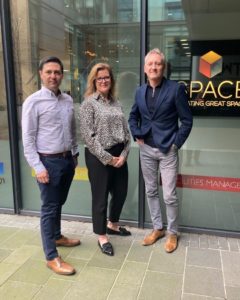Facilities Management started to become a definable ‘thing’ during the 90s and has slowly evolved to become so much more than janitorial services and fixing boilers. The focus of the industry is now very much on the workplace and how to achieve optimal performance by supporting the people who work in them. How did we get here, what were the key drivers for change, and more importantly, what will be the big challenges as we move forward in the new world order?
At around the same time that Space Solutions took its first steps into the world in 1997, I was beginning my career in FM. Like so many of us in a facilities role, I began in a related but totally different field before finally making the transition to FM by running a large government facility in the north of England. Some short, sharp lessons in customer service later, I realised I’d found my niche and have never looked back.
At that time, all of the big thinkers and academic minds were extoling the benefits of ‘Strategic FM’. If the FM industry wanted to be regarded as a serious player it had to differentiate itself from being just about cleaning and maintenance (and had to show it was more than just a cost centre to be endured). If applied strategically, it could actually be a profit centre, or at the very least an opportunity centre that could leverage benefits the execs were yet to even think of.
Strategic FM in PFI contracts
Undoubtedly, the impact of the UK Government’s rollout of the Private Finance Initiative (PFI) during the last 25 years has had a huge influence in defining the role of FM. The sheer scale of PFI opportunities in the early days (remember ‘Building Schools for the Future’ as only one example) rapidly propelled FM into the spotlight. We suddenly found ourselves at the same table as leading city financial institutions and global property developers, who in turn had to accept that their sophisticated funding models would never be viable without the long-term, concerted efforts of the FM organisation. TFM contracts, requiring the provision of virtually any and all non-core activity, propelled the humble FM into a whole new world of learning, development and technology.
The role of IT
As with most aspects of modern life, FM has been hugely impacted by advancements in technology. A basic grasp of Microsoft Word and Excel was pretty much all that was needed 25 years ago. Much has evolved over the intervening years of course. We’ve all had to become a dab-hand with spreadsheets, which still form the basis for much of the number crunching. The often quoted ‘what can’t be measured can’t be managed’ surely has no greater place than in the FM industry. I prefer to say, ‘if it can be measured, then the contract will probably say we have to.’ We’ve all had to become experts in KPIs, SLAs, audits, balanced scorecards, data analysis and reporting. FM being the natural domain of the Output Specification has squarely laid responsibility for measuring what we do and reporting it on our shoulders. Even the most modest of FM businesses these days must surely need to employ IT support and business systems development expertise.
Post-pandemic FM
Much has been written over the past couple of years about the impact of Covid on the workplace and what it means for the future of the office. FM was again at the forefront of change. Hybrid and flexi-working, alternating shift-patterns, extended working hours and 24/7 access are all set to challenge the status quo. Strategically minded FMs should use this sea-change shift in working arrangements as an opportunity to carry out a bottom-up review of all FM solutions and how they best-meet the needs of the business and building occupants.
The next 25-years
The fallout from Covid has provided a natural hiatus to the previous ‘normal’ order of things. I’ve outlined previously only a very few of the factors I’ve personally had to deal with as an FM practitioner since the turn of the millennium. The next quarter century will continue to see further evolution of these factors, whilst at the same time offering up challenges on a far greater scale. I am, of course, talking about Climate Change.
Climate Change
The built environment is a major contributor to climate change, accounting for almost 40% of energy-related CO2 emissions. The importance and role of FM as a service will only increase and will undoubtedly become even more data driven. The UK government has set a target for carbon neutrality by 2050 (2045 in Scotland), giving all UK businesses a milestone to work towards.
I can’t think of a single FM operation, function, or service delivery requirement that doesn’t impact on the environment in some way. Whether it be waste reduction in the supply chain of materials, reduced vehicle usage, removal of single-use plastics from the canteen or the purchase of green energy, we can all start to make a difference right now.
I often wonder what would happen if every FM in every organisation throughout the UK sat all of its employees down tomorrow and told them ‘with immediate effect we are changing the BMS settings – 1 degree cooler in the winter and I degree warmer in the summer.’ Who would actually notice the difference? Let’s be honest, heating and cooling issues are the bane of every FM’s life anyway, so a bit more flack wouldn’t really matter would it? In the process it could save thousands of tonnes of CO2. There is a lot of grand gesturing about carbon footprints and benchmarking, CO2 reduction plans and board level mission statements, etc. The truth is that strategically thinking FMs already know what needs to be done and are just getting on with the task at hand.
So the next 25-years will continue to be a challenging but rewarding time for facilities managers, but let’s face it, that’s why we do this job. Two days are never the same, right? Hopefully in 2047, when Space Solutions is celebrating its 50th Anniversary, we can also say ‘yes, and the FM industry helped to save the planet too.’




